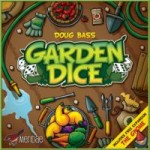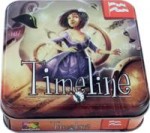Release Date: Nov 2012
$ 38.95
Garden Dice is a family strategy game that combines dice rolling, tile laying, and set collection. The game board depicts a garden as a 6×6 grid where seed and vegetable tiles are placed using dice rolls as coordinates. Players take turns using the dice to plant, water, and harvest five different types of vegetables with differing point values, from the lowly squash to the mighty eggplant. The game’s chaining mechanic allows players to water or harvest multiple tiles using a single action, enabling players to build upon each others’ chains. Players can also use bird and rabbit tiles to eat other players’ seed and veggie tiles, but not without paying a small penalty. Two other special tiles, the sundial and the scarecrow, allow players to modify dice rolls or protect their own tiles. Bonuses increase the values of tiles as they are harvested, and additional points are awarded at the end of the game for collecting sets. The player with the most points when the last tile is taken wins.
This Sounds like a good game to get and play with the kids. This is Meridae Games first game try it out and lets see what they come up with next.






